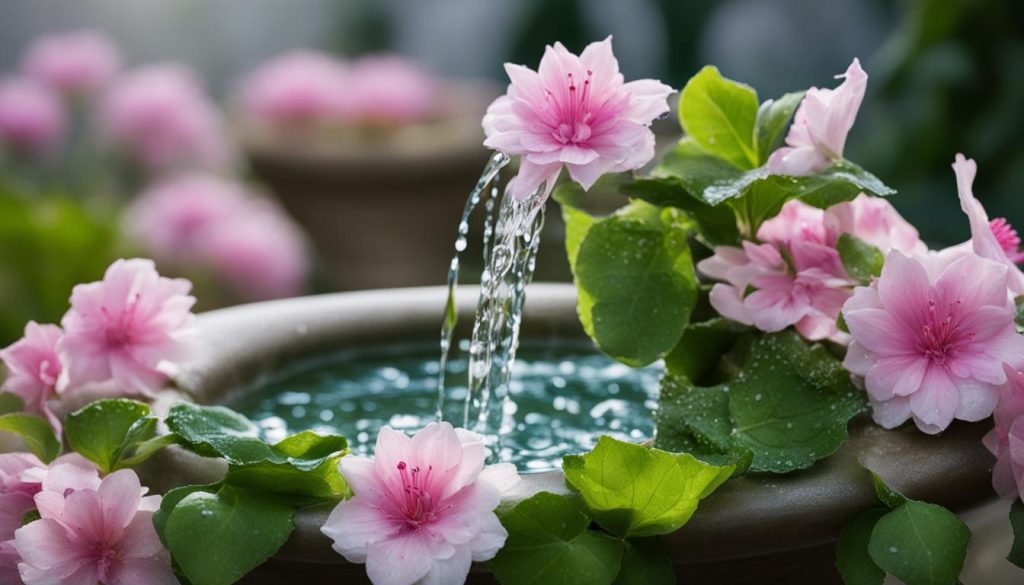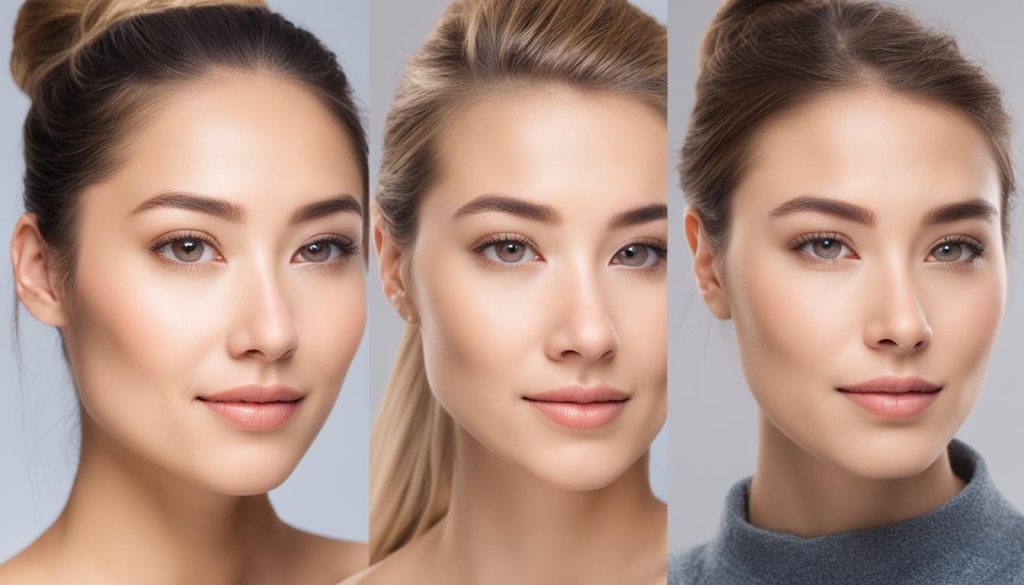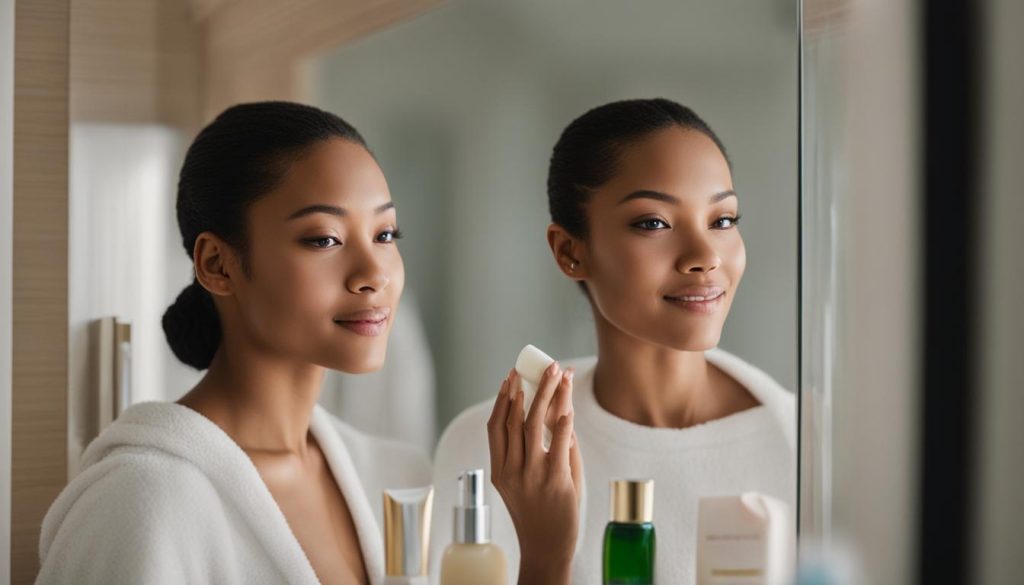As I navigate the intricate journey of life, I find the reflection staring back at me is one that’s continuously evolving. The texture, tone, and resilience of my skin have all undergone subtle yet significant transformations. This evolution has prompted me to delve deeper into understanding how to care for aging skin with meticulous precision. My foray into this area has been replete with valuable insights from skincare experts, the holistic benefits of natural remedies for aging skin, and a steadfast commitment to personal wellness. Through the amalgamation of these strategies, I’ve gleaned effective skincare tips for mature skin that not only enhance its appearance but fortify its health.
There’s a universal truth I’ve embraced: caring for my skin today is a profound nod to its past endeavors and a robust foundation for its future. I’ve learned that the simplicity of SPF application and the judicious choice of moisturizers are not just trivial daily routines, but acts of preservation against the inexorable march of time. Let’s explore these gentle, scientifically grounded approaches that mitigate the signs of time and uphold the skin’s natural vigor.
Tips for Caring for Aging Skin
- The importance of adapting skincare practices as skin matures for long-term health and appearance.
- Understanding hormonal differences in skin between men and women and the implications for each.
- Emphasizing the preventive benefits of early skincare regimens, particularly sunscreen use.
- Appreciating the minimal yet crucial steps to nourish and protect aging skin every day.
- Recognizing the power of both cutting-edge advice from dermatologists and time-honored natural remedies.
Understanding the Impact of Aging on Your Skin
As I navigate through the graceful journey of aging, I recognize that my skin is a testament to the life I’ve lived. It tells a story through every laugh line and furrowed brow, but understanding the factors that drive these changes is key to embracing skin care for women over 60 and beyond. Despite the inevitable signs of aging skin, there are measures we can take to slow down this process, ensuring our skin remains as vibrant as our spirits.
The Science Behind Aging Skin
It’s quite fascinating when you delve into the science of our body’s largest organ. I’ve learned that starting in our 30s, collagen and elastin—the proteins that keep our skin firm and elastic—decline at a rate of 1-2% annually. This gradual depletion is what leads to the common signs of aging skin, such as superficial fine lines and a lackluster complexion that many of us begin to notice.
Hormonal Differences Affecting Men and Women’s Skin
It’s not just time that affects our skin differently; our biological makeup does too. Interestingly, men’s skin, which is inherently 25% thicker due to higher collagen density, loses its firmness more gradually compared to women’s. On the other hand, women like myself, particularly during those transformative years in our 50s and 60s, may contend with a precipitous 30% loss of collagen during perimenopause, which significantly impacts skin’s elasticity and fullness.
Importance of Early Skincare Routines
A proactive approach to skincare for older adults is essential. I advocate for establishing personalized skincare routines at an earlier stage in life as both a preventative measure and a method of targeted treatment in later years. It’s crucial for effectively preventing wrinkles and ensuring over 60 skin care maintains its health and resilience. This might seem daunting at first, but the key lies in precision and regularity.
Caring for Aging Skin Through the Decades
As a dedicated connoisseur and advocate for healthy skin, I’ve observed the crucial transition of skin care practices as we age. From vibrant youth to graceful maturity, every decade demands a tailored approach to nurture and protect our largest organ. Here’s how I’ve guided my skin through the years, adapting to its evolving needs while keeping abreast of the best skin care for over 60, senior skin care, and caring for mature skin.
Skincare in Your 20s: Building the Foundation
My 20s laid the groundwork for a lifetime of skin health. This was the time I committed to cleansing my face twice daily, never forgoing the removal of makeup before bed, and diligently applying moisturizer followed by a broad-spectrum SPF 30. It was a simple yet effective routine, one that set the tone for the coming decades.
Skincare in Your 30s: Preventing Early Signs of Aging
Advancing into my 30s, I noticed the subtle hints of change. To preempt early signs of aging, I turned to retinol and alpha hydroxy acids like glycolic acid. They became my trusted allies in the battle against a dull complexion, encouraging cell renewal and preserving my skin’s youthful vigor.
Skincare in Your 40s: Addressing Sun Damage and Hormonal Changes
Time didn’t stand still, and neither did I. Entering my 40s meant confronting the consequences of sun worship and hormonal shifts. Antioxidants, particularly vitamin C and niacinamide, were introduced into my skincare routine to mitigate damage and encourage collagen synthesis, keeping my skin resilient in the face of time’s relentless march.
Skincare in Your 50s and Beyond: Intensive Moisture and Repair
The milestone of my 50s marked a shift to more intensive regimens. It became about more than just preservation; it was about rejuvenation. Emphasizing exfoliation, peptide-rich creams, and the plumping wonders of hyaluronic acid, I focused on delivering deep hydration and combating the evident impacts of collagen degradation. Now, surpassing 60 and approaching my 70s, I continue to seek out skincare for over 70 and skin care over 70 that aligns with my skin’s maturity, ensuring that it receives the utmost care in its senior years.
Essential Skincare Tips for Mature Skin
As I’ve deepened my understanding of age-defying skincare, I’ve learned the value in customizing my routine to cater to my mature skin’s unique demands. Knowing which products to choose and how to use them can make a significant difference in reducing the signs of aging. Here are some insights I’ve gleaned on keeping our skin looking and feeling resilient and refreshed.
Choosing the Right Cleanser for Sensitive Skin
Finding a cleanser that balances efficacy with gentleness has transformed my regimen. My mature skin loves a soothing formula that clears away impurities without over-drying. I’ve found that investing in cleansers aimed at healthy aging skin has helped in managing sensitivity and keeping my complexion clear.
The Role of Retinoids in Maintaining Youthful Skin
I heeded the advice to introduce retinoids into my routine in my thirties. These vitamin A derivatives have been instrumental in my quest for maintaining a youthful-looking skin. I started slowly, building up frequency as my skin adjusted, and I’ve noticed a marked improvement in texture and a reduction in fine lines.
Upgrade Your SPF Routine for Optimal Protection
No skincare routine for skincare for mature adults is complete without a staunch ally: SPF. I’ve learned that a broad-spectrum moisturizing SPF not only protects against sun damage but also offers added antioxidants for extra defense. It’s a cornerstone in my arsenal against environmental aggressors that contribute to aging.
- Seek gentle, hydrating cleansers that are kind to mature skin
- Invest in high-quality retinoids and use them consistently
- Choose a sunscreen that moisturizes and protects against a full spectrum of UV rays
Best Skincare Products for Aging Skin
As someone deeply invested in maintaining a youthful and radiant complexion, I’ve taken note that the secret to managing aging skin lies in the meticulous selection of skincare. I have found that the best products for aging skin are suffused with a blend of hydrating agents and defensive components that protect and rejuvenate the skin. Allow me to share a few exceptional products and ingredients that have become staples for my skincare tips for mature skin.
Hydrating Face Creams with Essential Fatty Acids
Hydration is crucial in maintaining a supple demeanor in mature skin. My go-to face creams are rich in essential fatty acids, like Omega-3 and Omega-6, that drench my skin in moisture and repair the skin’s barrier. These creams abound in the best products for mature skin for they effortlessly smooth out fine lines and work to fortify the dermis against environmental assailants.
- Gentle cleansers brimming with EFA’s preserve my skin’s natural oils while cleansing away impurities.
- Intensive night creams with ceramides and fatty acids deeply nourish and restore the skin as I sleep.
Antioxidant-Rich Sunscreens to Prevent Further Damage
The use of sunscreens rich in antioxidants constitutes an essential part of my skin care tips for aging skin. The harmonious duo of sun protection and antioxidants like Vitamins C and E combat photoaging and are indispensable for shielding my skin from ultraviolet radiation and free radicals. My daily regimen includes a broad-spectrum SPF fortified with these potent antioxidants, ensuring my skin is resilient in the face of sun exposure.
- Layering antioxidant serums beneath sunscreen boosts my skin’s defense against oxidative stress.
- Reapplying sunscreen periodically ensures continuous protection, especially during prolonged outdoor activities.
Delving into the realm of skincare for mature skin, one realizes that it’s not merely about choosing high-end products but about finding those that address the unique needs of aging skin. By incorporating face creams laden with essential fatty acids and protective sunscreens replete with antioxidants, my skin remains vibrant and fortified against the signs of time.

Enhance Your Diet for Healthier Skin
As an advocate for wholesome skin care for women over 60, I’m a firm believer in the importance of internal wellness for external beauty. Integrating a nutrient-rich diet is not simply a trend; it’s a fundamental aspect of caring for mature skin and a natural remedy for aging skin. Based on the insights of Dr. Jessica Wu, we understand that what we ingest contributes significantly to our skin’s health and our fight against the signs of aging, such as preventing wrinkles.
- Protein: I include ample protein in my diet to repair skin tissue and maintain collagen production.
- Vitamin C-rich Foods: I enjoy fruits like oranges and kiwis to boost my skin’s natural defenses against harmful environmental aggressors.
- Omega-3 Fatty Acids: Regular consumption of omega-3s through fish or flaxseeds to enhance skin’s elasticity and moisture levels.
- Lycopene-loaded Veggies: Cooked tomatoes are a staple in my kitchen, providing lycopene which helps to protect the skin from sun damage.
Moreover, I also pay close attention to avoiding certain substances that could derail my efforts:
- Limited alcohol intake, understanding it can dehydrate and accelerate aging.
- A conscientious approach to sugar and refined carbohydrates, which are known for their role in the aging process.
By combining these internal strategies with topical skin care routines, I reinforce the foundation for a vibrant, youthful complexion—proving that it’s never too late to cultivate beauty from within.
The Power of Supplements in Senior Skin Care
As we age, our skin’s natural ability to maintain its elasticity and radiance can diminish. Incorporating supplements into my anti-aging skincare routine is a step I’ve found to be beneficial, particularly for supporting skincare for over 70. Essential fatty acids like omega-3s have garnered attention for their role in not only enhancing skin texture but also in contributing to overall skin health for senior skin care.

Omega-3s and Their Effect on Skin Elasticity
The conversation around skincare for over 60 and skincare for over 70 often includes the significance of omega-3 fatty acids. These potent supplements are fundamental in maintaining my skin moisture levels and potentially delaying signs of aging like wrinkles, which can be more pronounced in old man skin or old lady skin. By ensuring these essential nutrients are part of my diet, I’ve noticed a visible improvement in my skin’s suppleness.
Addressing Nutrient Deficiencies for Skin Radiance
To combat the signs of an aging complexion, my focus remains on addressing nutrient deficiencies that are common with older adults. A comprehensive anti-aging skincare routine tailored to our unique needs often requires more than topical treatments; it includes supporting our bodies from the inside out. From personal experience, I’ve discovered that incorporating the right supplements can enhance the natural radiance of my mature skin.
- Consulting with a healthcare professional before starting any new supplement regimen
- Including omega-3 rich foods like seafood or flaxseed in my diet
- Incorporating other skin-nourishing supplements such as vitamins A, C, E, and minerals like zinc and selenium
I remind myself that consistency is key, and by continuing a well-rounded approach, I nurture my skin to reflect its inherent vitality and strength.
Gentle Exfoliation Techniques for Old-Man Skin and Old-Lady Skin
As a professional journalist deeply immersed in the nuances of skincare for older adults, I understand the significance of maintaining a regimen that adapts to the evolving needs of mature skin. It’s an essential aspect of age-defying skincare, especially when focusing on preventing wrinkles and sagging skin to preserve a youthful, glowing appearance. Now, let’s discuss a critical component of this regimen: gentle exfoliation.
Through my research and interviews with industry experts like dermatologists, I’ve learned that as we age, cell turnover slows down. This suggests that the body’s natural ability to shed dead skin cells diminishes, potentially leaving one’s complexion looking dull and exacerbating the visibility of wrinkles. The solution? Incorporating a weekly exfoliation routine that can aid in how to care for aging skin, thus revitalizing your complexion without causing undue stress to the skin.
- Select a scrub designed with smooth, round particles to gently buff away dead skin cells. I emphasize the ‘gentle’ to mitigate the risk of micro-tears which can result from using overly abrasive products.
- Apply with a light touch, using circular motions to massage the exfoliant across your face. This encourages blood flow, ensuring a richer delivery of oxygen and nutrients to your skin cells.
- Rinse with lukewarm water, as hot water can lead to drying out your skin further, and follow up with a hydrating moisturizer to soothe and protect the newly exposed skin cells.
Moreover, it’s paramount to avoid exfoliants containing plastic microbeads not only for their abrasive nature but also due to their detrimental environmental impact. In fact, I implore all my readers to make environmentally conscious choices when selecting their skincare products.
The results of employing these gentle exfoliation techniques can be transformative, offering a path to restore the natural luminescence of aging skin that each individual deserves. It’s more than just skincare; it’s about embracing a routine that honors and celebrates the beauty of maturity.
Conclusion
In my journey to maintain the vitality and resilience of my skin, I’ve discovered that the cornerstone of age-defying skincare is a consistent anti-aging routine. Tailoring this routine to the specific changes my skin undergoes as it matures allows me to address concerns proactively and efficiently. Skincare tips for mature skin emphasize the importance of individualized care, and rightly so, as my skin’s needs today are not what they were a decade ago.
Creating a Consistent Anti-Aging Skincare Routine
Adopting an anti-aging skincare routine encapsulates much more than the occasional application of creams or serums; it is about steadfast dedication to nurturing my skin daily. I integrate natural remedies for aging skin into my regimen, employing the benefits of antioxidants found in my diet, and supplements that aid my skin’s repair processes from the inside out. This comprehensive approach ensures that each day, my skin receives the care it needs to appear youthful and radiant.
Embracing Natural Remedies and Professional Treatments
Furthermore, I recognize the power of synergy between at-home care and professional treatments. Key interventions guided by skincare experts have become invaluable, especially when tackling specific issues that over-the-counter products alone cannot address. I’ve learned to embrace these solutions, understanding that aging gracefully is not about avoiding age but about caring for my skin in the best way possible at each stage of life. By emphasizing an integrated approach to an anti-aging skincare routine, tips for youthful-looking skin become part of a lifestyle that celebrates maturity with grace and beauty.
FAQ
What key steps should I include in caring for aging skin?
Caring for aging skin should involve a gentle cleansing routine, consistent hydration, use of SPF, and targeted treatments such as retinoids and antioxidants. Adopt skincare products rich in essential fatty acids and adapt your skincare routine as you progress through different decades of life.
How does aging affect my skin?
Aging leads to a gradual loss of collagen and elastin, a slowdown in skin-cell turnover, and a buildup of dead skin cells, which can manifest as fine lines, wrinkles, and a dull complexion.
Why is it important to start a skincare routine early?
An early skincare routine is crucial for long-term benefits, as it helps to prevent and delay the onset of signs of aging, such as wrinkles, sagging skin, and pigmentation issues, by maintaining healthy skin habits from a young age.
Are there differences between men’s and women’s skin as they age?
Yes, hormonal differences can lead to men having thicker skin with tighter and firmer properties for a longer period, whereas women may experience a more dramatic loss of skin firmness and collagen, especially during perimenopause and beyond.
What skincare routine adjustments are necessary in my 50s and 60s?
In your 50s and 60s, skincare routines should focus on intensive moisture and repair, prioritizing exfoliation, using peptide creams, and hydrating with products containing hyaluronic acid to address the increased effects of collagen loss.
How can I select the best skincare products for my mature skin?
Look for products that contain essential fatty acids, antioxidants, and ingredients that can lock in moisture such as ceramides or hyaluronic acid. A richer face cream may help to reduce fine lines and wrinkles.
Can my diet affect the health of my aging skin?
Absolutely, a diet rich in protein, vitamin C, and omega-3 fatty acids supports healthier skin. It is also advised to minimize intake of dehydrating substances like alcohol, as well as high sugar and refined carbs.
What role do supplements play in caring for mature skin?
Supplements, particularly omega-3 fatty acids, can help improve skin moisture and elasticity, potentially delaying the appearance of wrinkles. Always consult with a healthcare professional before adding supplements to your regimen.
How does gentle exfoliation benefit senior skin?
Gentle exfoliation helps remove dead skin cells, revitalizes the complexion, and restores natural luminosity to the skin, which is especially beneficial as the natural shedding process slows down with age.
What are some natural remedies for aging skin?
Natural remedies may include using ingredients like aloe vera, jojoba oil, and green tea extracts, which can help soothe, moisturize, and protect the skin against environmental damage.






